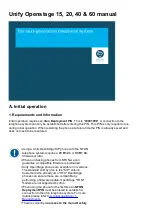
iv
Introduction
Congratulations on your new SAILOR HC4500B MF/HF maritime radio telephone with built-in
DSC (Digital Selective Calling) system, fulfilling the highest international standards for
marine MF/HF communication and safety procedures. If connected to a GPS or other
maritime navigation system it can automatically include the true UTC time and your position
in its DSC distress messages. For an explanation of DSC, see page 2.
This SAILOR marine equipment is a part of the modular system 4000 which also includes a
HF single sideband radiotelephone.
SAILOR marine equipment is specially designed for the extremely rugged conditions on bord
a ship, based on more than 50 years’ experience with all kinds of boats, from small pleasure
crafts, over fishing boats working under all climatic conditions, to the biggest ships.
SAILOR
®
is one of Europe’s leading manufacturers of maritime radiocommunication
equipment - a position which has been maintained by means of constant and extensive
product development. We have a worldwide network of dealers with general agencies in
more than 80 countries. All our dealers are specially trained to service all your SAILOR
®
products.
About this manual
This manual is for the daily user of the system. Additionally, it includes a section on the
installation procedures, and - on page ii - standard distress procedures. We highly recom-
mend you to read the manual
before
you start using the equipment.
Notice: There may be some minor differences in the graphic layout of the manual compared
to the physical device.
Please note
Any responsibility or liability for loss or damage in connection with the use of this product and
the accompanying documentation is disclaimed. The information in this manual is furnished
for informational use only, is subject to change without notice, may contain errors or inaccu-
racies, and represents no commitment whatsoever. This agreement is governed by the laws
of Denmark.
Doc. No.: B4500BGB0
Issue: B/0211
0211





































